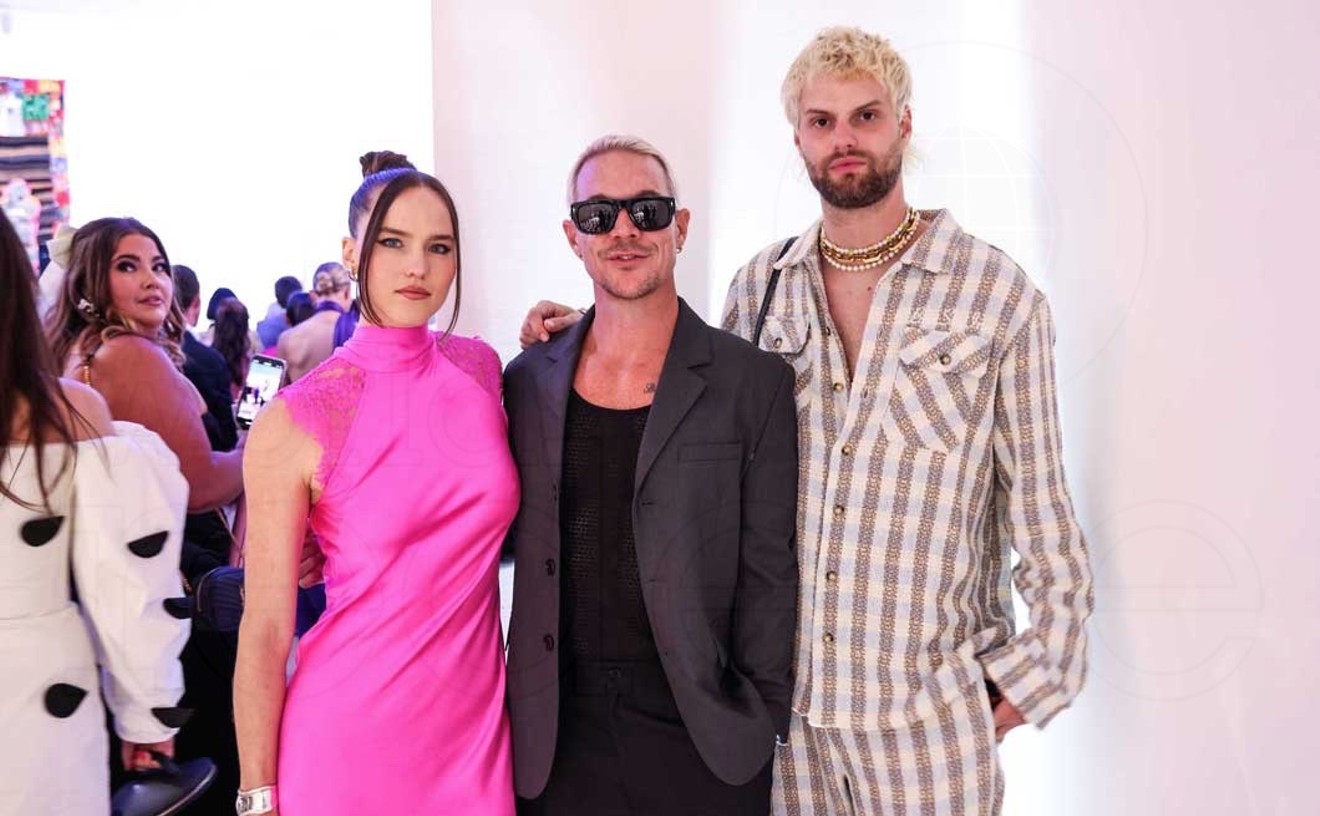To this list add the relationship that fuels Gen LeRoy's Not Waving . . ., her first work for the stage. In Not Waving . . ., LeRoy (a New York City-based author of children's books, young adult novels, cookbooks, and screenplays) gives us the unpredictable Nicole (Alice Haining), imbued with a passion for social change yet suffering from psychological disorders, and her unassuming mother Gabby (Sloane Shelton), a retired cafeteria worker who denies her daughter's condition. Don't expect that denial to explode into accusational fireworks, however. Unlike the plays mentioned above, which emphasize their characters' inability to understand one another, this play takes us on a journey of discovery as the two women attempt to cope with Nicole's mental illness. At times tender and funny, at times fragmented and contrived, this poignant yet uneven world premiere at the Pope Theatre Company in Manalapan benefits from superb acting and from Louis Tyrrell's generally insightful direction.
The play opens with Gabby in a doctor's office at a psychiatric hospital, where she waits for Nicole to be released into her care. The survivor of countless suicide attempts, hospital stays, and an ugly divorce, Nicole feels almost ready to tackle life on her own again, and she wants to move in with her mother until she gets her feet on the ground. Gabby cannot refuse her, although she seems uncomfortable around her daughter. "It's crippling when something goes wrong with a child," she confesses to the audience. "I don't get her." Eventually, however, Gabby overcomes her apprehension, won over by Nicole's infectious energy, commitment to her own ideals, and harebrained scheme to kidnap her cat back from her ex-husband Mark (Stephen G. Anthony) and his current wife Helen (Nancy Jo Carpenter). More than anything, though, Gabby is won over by Nicole's belief in and love for her. Their relationship deepens until, by the end of the play, LeRoy has transformed the mother from a reluctant caretaker into the protector and advocate Nicole will need throughout her emotionally rocky life.
Gabby's transformation unfolds through a series of episodes, some more engaging than others. At the outset, LeRoy relies on talky exposition instead of action and conflict to set up her story. In particular, the restaurant scene during which we first meet Nicole demands unsentimental editing. Tyrrell, who manages to impose expert pacing on the rest of the evening, doesn't help matters here when he keeps Nicole and Gabby glued to a table tediously exchanging information, rather than finding ways for them to move around the room.
Infinitely more exciting are flashbacks and present-day confrontations involving Gabby, Nicole, Mark, and Helen. Relegated to a subplot, the subject of Nicole's failed marriage simmers with so much emotional menace and palpable tension that it threatens to overpower the more delicate mother-daughter story line. Were LeRoy to integrate the two narrative threads more seamlessly A as she does when Gabby finally tells Mark over the phone what she thinks of how he treated Nicole -- the writer might unleash an intensity that now remains untapped.
Though presentable in its current incarnation, Not Waving . . . needs a round or two back at the drawing board in order to smooth out structural awkwardness and to tease out aspects of the story that still demand to be told. This includes a more specific definition of Nicole's disease. As written, she has been diagnosed by her doctor as having "personality disorders" and "mood disorders"; in that case she might be suffering from obsessive-compulsive disorder or hysteria or clinical depression or bipolar disorder (the current psychiatric term for manic depression) or some other unnamed condition. Perhaps LeRoy didn't identify Nicole's disease so she wouldn't have to describe it in precise medical jargon; in fact, the play's power lies in its emotional explorations and not in its technical explanations. Then again, as an interview with LeRoy in the program suggests, the playwright wanted the generic term "disorder" to serve as a metaphor for Gabby and Nicole's relationship. Either way, not naming Nicole's condition seems like an avoidance of something crucial to the credibility of the work.
Ultimately what buoys Not Waving . . . is the relationship between Gabby and Nicole, delineated in this production through splendid performances. Sloane Shelton, seen as the salt-of-the-earth mother in the Pope's production of Men's Lives last season, delivers an equally memorable performance here. The actress infuses Gabby with joy as the character moves from fear and insecurity to strength and self-expression. Even when the script calls for her to use new-age phrases such as "empowered" and "your anger is addictive," her connection to her character proves so clear that she finds the real feeling behind such psychobabble. In the end she lends Gabby's devotion to Nicole a shimmering heroism.
In turn, Alice Haining heartbreakingly portrays Nicole as someone who, despite desperately wanting to lead a self-sufficient life, is crippled by mental illness. Her performance embodies the notion of being overwhelmed by life, which serves as the inspiration for the play's title. In the late British writer Stevie Smith's poem "Not Waving But Drowning," a man confesses that, even though he literally did die by drowning, while he was alive "I was much too far out all my life/And not waving but drowning."
Also last seen in Men's Lives, Stephen G. Anthony expertly portrays not only ex-husband Mark but also all the other male characters, including the doctor and a day-care director. Nancy Jo Carpenter, taking on all the nonstarring female roles, brings appropriate selfishness in particular to her depiction of yuppie Helen.
Multiple award-winning designer (Tony, Oscar, and Carbonell) Tony Walton, who also happens to be LeRoy's husband, provides a surprisingly nondescript set, one dominated by geometric shapes cut out of the back wall; it also includes movable blocks and cubes that function as different articles of furniture from one scene to the next. The design works best during the cleverly staged cat-stealing scene, in which the space behind the shapes in the back wall serves first as the basement of an apartment building and then as an apartment itself. Lighting designer Kirk Bookman uses changing colors and dappled shadows against the blank canvas of Walton's basic set to create a variety of settings: a doctor's office, a restaurant, a cabin, a day-care center, and the interior of a car. Costume designer Sharon Sprague's attention to detail results in imaginative costumes that express each character's personality: Nicole's eclectic pastiche of flowered shirt, long skirt, and multicolored high-top sneakers; Gabby's cardigan and trench coat; and the rust-colored outfits accented by ivory and black accessories worn by Anthony and Carpenter when they're playing advertising sophisticates.
Director Tyrrell recently won the 1994-95 George Abbott Award for Outstanding Achievement in the Arts, an honor conferred by the Carbonell Awards committee each year. Presenting work by a first-time playwright, as Tyrrell does with Not Waving . . ., provides a perfect example of why he received that honor. Although the play needs to be pared down in certain places and expanded in others, it contains powerful, moving, and very dramatic elements. In his commitment to the development of fresh and challenging contemporary theater -- the Pope hosts a monthly New Voices series in which never-before-staged plays receive initial readings -- Tyrrell recognized the strengths in Not Waving . . .. As a result of his bringing it to the Pope's main stage, South Florida audiences, who don't often have the chance to see new work, can enjoy the pleasures of hearing an evolving dramatic voice.










